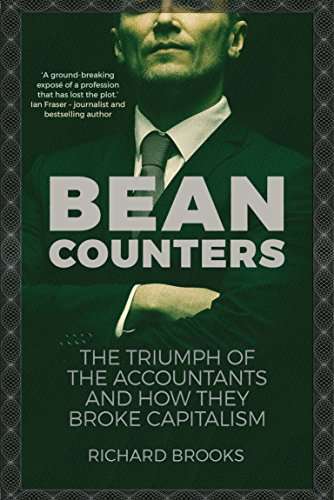
Bean Counters: The Triumph of the Accountants and How They Broke Capitalism
Check my rate
| Main centres: | 1-3 business days |
| Regional areas: | 3-4 business days |
| Remote areas: | 3-5 business days |

| Main centres: | 1-3 business days |
| Regional areas: | 3-4 business days |
| Remote areas: | 3-5 business days |
Published by Atlantic Books,, 2018, softcover, index, 342 pages, condition: new.
The world's 'Big 4' accountancy firms - PwC, Deloitte, Ernst & Young, and KPMG - have become a gilded elite. Up in the high six figures, an average partner salary rivals that of a premier league footballer. But how has the seemingly humdrum profession of accountancy got to this level? And what is the price we pay for their triumph?
Leading investigative journalist and former senior tax inspector Richard Brooks offers a ground-breaking exposé of the accountancy industry and its secret rise to vast global influence. Charting the profession's history from humble agrarian beginnings to its underappreciated role in the financial crash of 2008, Brooks explores how the industry hides behind its 'boring' image to ruthlessly exploit the financial system which depends on it. From underpinning global tax avoidance to corrupting world football, Beancounters reveals how the accountants use their central role in the economy to sell management consultancy services that send billions in other work its way - transforming the industry from one that ensures financial probity to one that reinvents the rules for its own benefit.
Richard has written an entertaining and thorough account of the audit and accounting profession from its inception.
His main concept is that they have become, despite their ethical beginnings, no more than the tools of corrupt companies, too big to fail, with over 70% of their businesses in consulting, with huge income from tax avoidance and the use of tax havens, promoting schemes like PFI, using accounting rules to the limit and beyond and placating those who given them their income so that they do not lose business.
This is an excoriating analysis by a former taxman, turned Private Eye journalist who has researched his story well, understands the mentality of the accountant and the squeamishness of those who could make the problem better but fail to do so - i.e. those in government, those who are meant to oversee the profession, those in leading positions in the profession.
No book can detail every situation or every cause and there are a few areas that are omitted: one is the fact that many accountants are employed outside of the profession, working in business and other sectors. An understanding of their position, how they interact with those in audit firms and whether there is a different mentality would have been interesting. The second is how the profession, which includes the audit firms but is not limited to them, tries to oversee itself through its rule-making (which is commented on in brief) and ethically (through IESBA, for example, which is not mentioned).
The book focuses on the Big 4 as they are now and shows clearly that the world is no longer safe from fraud, tax evasion, false accounting, public funding expropriation by companies relying on public sector naivety and any other madcap schemes because we cannot rely on external auditors. Richard provides some guides to resolve this but this will now need huge governmental commitment against the likely and continuous lobbying that the Big 4 will throw against any changes.